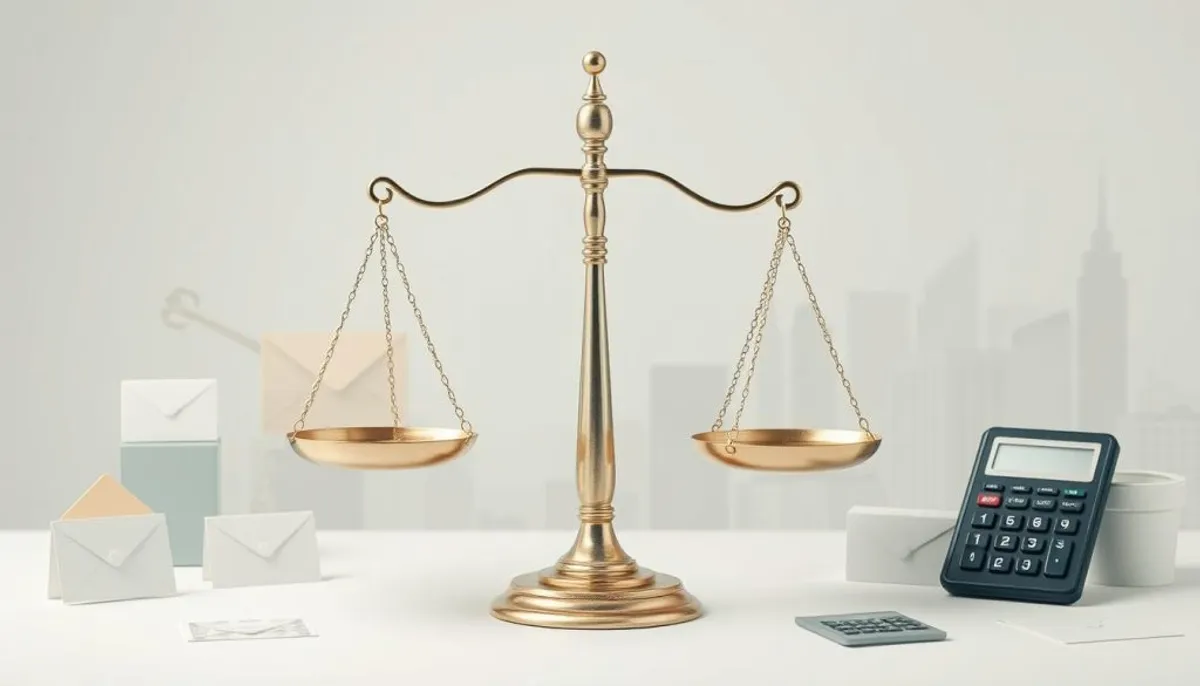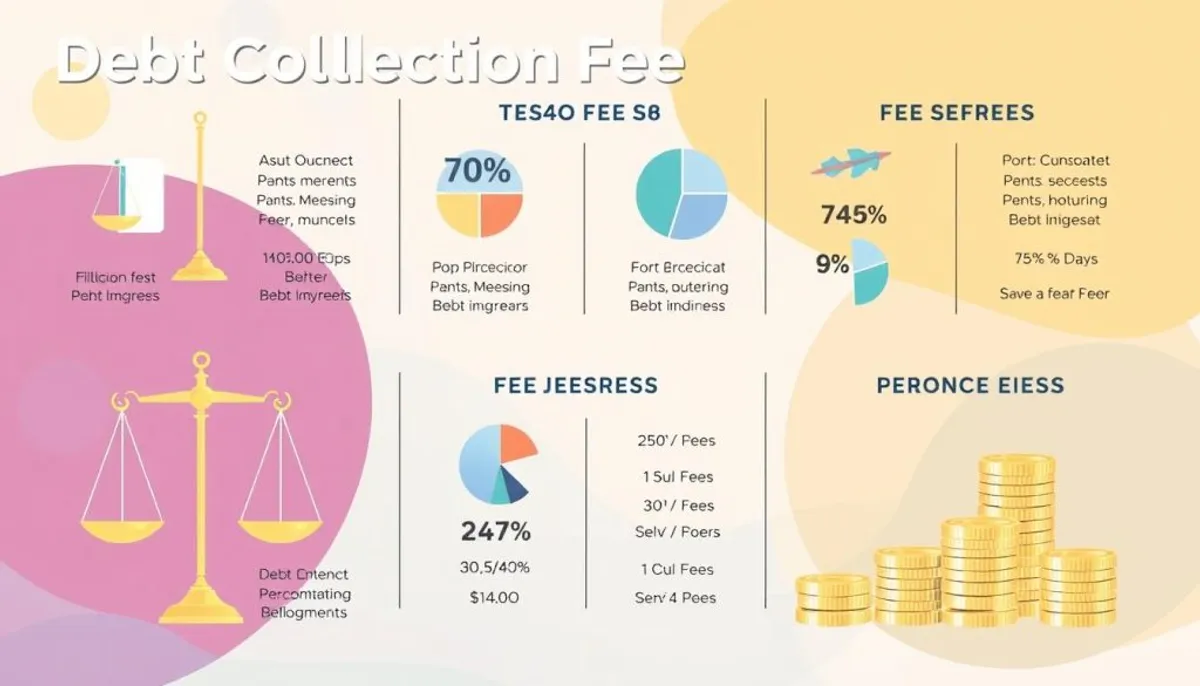Unpaid invoices can severely impact your business’s cash flow. At such times, considering debt recovery services becomes imperative. This guide aims to elucidate the intricacies of engaging a collection agency. We will explore the advantages of professional debt collection and the criteria for selecting an agency that aligns with your business’s requirements.
Engaging third-party collections can revolutionize your accounts receivable management. With a proficient partner, you can concentrate on your core activities while experts tackle the challenging task of debt collection. We will examine the strategies to integrate this approach effectively into your operations.

Collection agencies possess specialized expertise, including knowledge of relevant laws and advanced tracking tools. Their compensation structure, often based on a percentage of recovered debts, incentivizes them to achieve optimal results. This model underscores their commitment to successful debt recovery.
Before committing to a collection agency, it is advisable to explore alternative avenues. Acknowledge that hiring a collector may not yield the full amount owed. Yet, for debts aged 3 to 6 months, it might be the most viable option to recover any funds.
Key Takeaways
- Collection agencies specialize in recovering different types of debts
- Fees typically range from 25% to 45% of collected amounts
- Agencies offer expertise in legal and financial matters
- Consider debt collection after exhausting other options
- Collectors need both hard skills and soft skills for success
- Agencies may use skip tracing to find elusive debtors
- Hiring a collector is often more cost-effective than legal action
Understanding the Need for Professional Debt Collection
Businesses often encounter financial hurdles when clients delay payments. Unpaid invoices can severely disrupt cash flow, impeding growth and stability. Professional debt collection services provide a viable solution to this widespread issue.
The Impact of Unpaid Invoices on Business Cash Flow
Customer payment delays can trigger a cascade of problems. Companies find it challenging to manage expenses, invest in new opportunities, and maintain financial stability. Thus, delinquent account collection becomes essential for preserving healthy cash flow and ensuring business continuity.
When to Consider Professional Collection Services
If internal efforts fail to recover debts within 90-120 days, professional assistance is warranted. Commercial debt recovery agencies bring specialized expertise and resources to efficiently resolve outstanding payments. They operate on a contingency basis, ensuring you only pay for successful collections.
Common Challenges in Debt Recovery
Debt recovery is not without its complexities. Locating debtors, navigating legal frameworks, and balancing recovery efforts with customer relations are significant challenges. Professional agencies possess the necessary tools and strategies to overcome these obstacles, enhancing debt recovery success rates.
- Difficulty in locating debtors
- Complex legal requirements
- Balancing debt recovery with customer relations
- Limited in-house resources and expertise
Collaborating with a professional collection agency allows businesses to concentrate on their core activities while experts handle delinquent account collection. This strategy not only enhances cash flow but also safeguards valuable customer relationships.
Benefits of Partnering with Collection Agencies
Collaborating with collection agencies can significantly benefit businesses facing unpaid debts. These entities provide specialized services that enhance debt recovery outcomes and streamline the collection process.
Professional Expertise and Resources
Collection agencies elevate debt portfolio outsourcing with their professional acumen. They are well-versed in debt collection laws and regulations, ensuring compliance and mitigating legal risks for businesses. Their specialized skills and resources empower them to manage complex cases efficiently.
Higher Success Rates in Debt Recovery
The expertise of collection agencies translates into superior recovery rates, surpassing in-house efforts. Their tailored strategies and experience in dealing with diverse debtors lead to more successful outcomes. This efficiency can substantially enhance a business’s cash flow and financial stability.
Time and Resource Management Benefits
Outsourcing debt collection liberates valuable time and resources for businesses. By entrusting this task to professionals, companies can concentrate on their core activities, boosting productivity. The time saved can be channeled towards growth initiatives and enhancing customer relationships.
| Benefit | Impact |
|---|---|
| Higher Recovery Rates | Increased revenue |
| Time and Resource Savings | Improved productivity |
| Legal Compliance | Reduced risk of disputes |
| Faster Payments | Improved cash flow |
Legal Compliance and Regulations in Debt Collection
Debt collection laws are pivotal in safeguarding both consumers and businesses. The Fair Debt Collection Practices Act (FDCPA) is the cornerstone of federal legislation governing debt collection in the United States. It delineates strict guidelines for debt collectors, explicitly prohibiting abusive, unfair, or deceptive practices.
Under the FDCPA, debt collectors are subject to several constraints:
- No contact before 8 a.m. or after 9 p.m.
- No harassment over the phone or through other forms of contact
- Must offer a simple method for debtors to opt out of electronic communications
- Required to contact the attorney if one represents the debtor

State laws frequently align with or augment the FDCPA. For instance, the Texas Debt Collection Act bars threats of violence, profanity, and false accusations of crimes against consumers. Those who violate these laws face both criminal and civil repercussions.
| Restriction | FDCPA | Texas Debt Collection Act |
|---|---|---|
| Calling hours | 8 a.m. to 9 p.m. | 8 a.m. to 9 p.m. |
| Harassment | Prohibited | Prohibited |
| False accusations | Prohibited | Prohibited |
| Wage garnishment | Limited | Limited to specific debts |
Debtors possess rights under these statutes. They can challenge inaccuracies in their credit reports and lodge complaints about unfair practices with the Consumer Financial Protection Bureau. Grasping these regulations is critical for both debt collectors and consumers to uphold fair and lawful debt collection practices.
Hiring a Debt Collection Agency: Essential Steps
Choosing the right debt collection agency is paramount for successful debt resolution strategies. This involves a detailed evaluation of several critical factors. These ensure the agency aligns with your business’s specific needs.
Evaluating Agency Credentials
Begin by scrutinizing the agency’s licensing and certifications. Each state has unique requirements, so it’s vital to confirm compliance with local laws. For medical debts, verify that the agency is HIPAA certified. Agencies with experience in your industry can significantly boost recovery rates.
Understanding Fee Structures
Debt collection agencies employ various fee structures. These can include flat fees, contingency-based payments, or debt buying arrangements. Select a structure that matches your financial objectives. Transparency in fee communication is crucial for budgeting and fostering trust.
Reviewing Collection Methods
Examine the agency’s collection methods closely. Effective agencies use skip tracing to find absent debtors and tailor strategies for optimal recovery. Consider their communication style and reporting frequency. Some agencies provide real-time reports or online portals for tracking account activity.
| Factor | Importance |
|---|---|
| State Licensing | Mandatory |
| Industry Experience | High |
| Fee Structure | Variable |
| Collection Methods | Critical |
| Reporting Practices | Important |
By meticulously assessing these factors, you can make an informed choice in selecting a collection agency. This leads to more effective debt resolution strategies.
Key Features of Reputable Collection Agencies
Choosing a debt collection agency requires attention to certain key features. These distinguish reputable firms from others. They ensure effective debt recovery, uphold professional standards, and adhere to legal requirements.
Skip Tracing Capabilities
Top-tier agencies utilize skip tracing to locate debtors who have evaded detection by moving without leaving a forwarding address. This advanced technique significantly boosts the likelihood of successful debt recovery. It is invaluable for tracking down elusive individuals.
Insurance Coverage and Bonding
Reputable collection agencies possess the necessary insurance, commonly referred to as “Errors and Omissions Insurance.” This insurance safeguards both the agency and its clients against potential lawsuits stemming from collection activities.
Technology and Reporting Systems
Modern debt collection technology is essential for efficient operations. Leading agencies leverage advanced systems to streamline the collection process and offer real-time updates to clients. These systems typically include:
- Automated payment reminders
- Digital debt resolution platforms
- Comprehensive reporting dashboards
The Commercial Collections Agencies of America underscores the significance of prompt billing and the utilization of reputable outside collection agencies for managing past due accounts. Agencies holding credentials from organizations like the International Association of Commercial Collectors demonstrate their commitment to industry standards and ethical practices.
When assessing collection agencies, consider their longevity, staff experience, and technological access. These elements are crucial for an agency’s effectiveness in debt collection across various sectors. They ensure efficient account management and enhance debt recovery success rates.
Understanding Collection Agency Fee Structures
Understanding the fee structures of debt collection agencies is essential. These fees are influenced by various factors, including the debt’s age, the amount owed, and industry specifics. Most agencies adopt a contingency fee model, charging a percentage of the recovered amount.

Contingency fees typically range from 20% to 50% of the collected debt. For instance, The Kaplan Group employs a tiered fee structure based on claim size:
- 50% for claims $1,000 and under
- 25% for claims $1,000-$5,000
- 20% for claims $5,000-$50,000
- 15% for claims $50,000-$500,000
- 10% for claims over $500,000
Some agencies base their rates on debt age:
- 20% for claims under 90 days
- 25% for claims 90-180 days
- 33% for claims 6-12 months
- 40% for claims 1-2 years
While lower fees might appear more appealing, choosing an agency with low fees but poor results can be costly. It’s crucial to evaluate an agency’s performance and reputation alongside their fees. A reputable agency with higher fees may ultimately save you money and deliver superior results in your debt recovery endeavors.
Preparing Documentation for Collection Agencies
When engaging a debt collection agency, the importance of accurate documentation cannot be overstated. The compilation of precise accounts receivable documentation and debt collection records is paramount for enhancing recovery prospects. Let’s examine the critical documents required for this endeavor.
Required Financial Records
The initiation of the collection process necessitates the assembly of exhaustive financial records. These encompass:
- Detailed invoices delineating exact amounts owed
- Account statements with transaction histories
- Purchase orders and delivery receipts
- Copies of bounced checks
- Credit reports and financial statements
Communication History Documentation
Accurate documentation of all interactions with the debtor is indispensable. This entails:
- Dated call logs
- Copies of sent letters and emails
- Notes from any verbal conversations
- Payment arrangement confirmations
Contract and Agreement Records
It is imperative to furnish all pertinent contracts and agreements, such as:
- Signed credit applications
- Service agreements
- Promissory notes for payment plans
- Security documents
By furnishing comprehensive accounts receivable documentation and debt collection records, you empower the agency with the necessary resources for effective debt recovery. It is crucial to maintain the currency of all records, including updates on debtor information or financial status.
Alternative Solutions: Introducing ti3 Platform
In the realm of debt collection, new solutions are surfacing to tackle the hurdles businesses encounter. The ti3 platform presents a novel method for managing overdue accounts, blending technology with efficiency.
Automated Payment Reminders
The ti3 platform transforms automated debt collection with its advanced reminder system. It dispatches timely, customized digital payment reminders to clients, obviating the necessity for manual interventions. This strategy has been proven to elevate on-time payment rates by up to 25%, ensuring businesses sustain a robust cash flow.
Digital Debt Resolution Tools
Ti3’s digital debt resolution tools simplify the collection process. These tools encompass online payment portals, negotiation interfaces, and payment plan generators. By introducing flexible payment alternatives, businesses leveraging ti3 have witnessed a 40% diminution in the time required to settle overdue accounts.
Client Relationship Management Features
The platform’s CRM functionalities are instrumental in fostering positive client interactions during the collection phase. It chronicles communication history, schedules follow-up reminders, and offers insights into client payment patterns. This comprehensive strategy has resulted in a 15% enhancement in client retention rates for entities utilizing ti3.
| Feature | Benefit | Impact |
|---|---|---|
| Automated Reminders | Timely Follow-ups | 25% increase in on-time payments |
| Digital Resolution Tools | Streamlined Collection | 40% reduction in resolution time |
| CRM Features | Improved Client Relations | 15% increase in client retention |
The ti3 platform presents a cost-effective alternative to conventional debt collection agencies. It empowers businesses to manage overdue accounts efficiently, while safeguarding precious client relationships.
Maintaining Customer Relationships During Collections
The art of balancing debt collection ethics with customer retention is intricate. Studies reveal that acquiring a new customer can be five times more expensive than retaining an existing one. This highlights the critical role of maintaining positive relationships during the collection process.
Effective communication is paramount. It’s known that over 30% of communication is conveyed through tone and word choice. Debt collectors must validate customer concerns, fostering a safe space for open dialogue. This method aids in managing the embarrassment debtors often feel, preventing defensive behavior.
Providing flexible payment options showcases empathy and encourages problem-solving collaboration. Polite yet firm reminders, strategically timed, can motivate debtors without causing discomfort. When necessary, mediation or professional collection services can be alternatives to legal action.
- Establish clear terms and agreements
- Use a good CRM system for effective communication
- Offer flexible payment options
- Engage in active listening
- Consider professional collection services when needed
By focusing on ethical debt collection practices and customer retention strategies, businesses can recover debts while preserving valuable relationships. This approach not only aids in immediate recovery but also contributes to long-term business success.
Measuring Collection Agency Performance
Evaluating a collection agency’s performance is essential for businesses aiming to enhance debt recovery metrics and collection agency ROI. By tracking key indicators, companies can assess the efficacy of their chosen agency. This enables them to refine their debt recovery strategies effectively.
Success Rate Metrics
Success rate metrics offer crucial insights into an agency’s debt recovery prowess. These metrics encompass:
- Collection Efficiency Ratio: The percentage of total owed amounts collected
- Days Sales Outstanding (DSO): Time taken to convert invoices into cash
- Bad Debt Write-Off Rate: Indicates the need to reassess credit extension criteria
Communication Effectiveness
Effective communication is pivotal for successful debt recovery. Agencies should be assessed on their communication prowess in:
- Securing promises to pay (PTP percentage)
- Resolving deduction issues promptly
- Providing timely credit evaluations
Return on Investment Analysis
Analyzing the ROI of a collection agency is vital for businesses to evaluate the partnership’s value. Key considerations include:
- Amount Collected Per Collections Employee
- Collections Cost: Ratio of agency payment to total amount collected
- Cycle Time: Debt to Recovery
| Metric | Description | Importance |
|---|---|---|
| Collection Effectiveness Index (CEI) | Ratio of monies received to total receivables | Higher percentage indicates better performance |
| Age at List (AAL) | Average number of days an account is past-due | Highlights importance of timely collection |
| Promise to Pay (PTP) Percentage | Number of secured promises to pay | Reflects efficiency in setting up collection plans |
By regularly monitoring these debt recovery metrics and analyzing collection agency ROI, businesses can ensure they are maximizing their debt recovery efforts. This approach helps maintain a profitable partnership with their chosen agency.
Conclusion
Professional debt collection is essential for maintaining healthy accounts receivable management. Collection agencies, with their higher success rates and diverse techniques, significantly enhance cash flow for businesses. They navigate complex legal landscapes, ensuring compliance while maximizing debt recovery chances.
The initial cost of hiring a collection agency might seem daunting. Yet, the long-term benefits often justify the expense. Agencies handle large volumes of cases, employ advanced technology, and use skip-tracing to locate debtors. Their deep understanding of consumer behavior aids in negotiations, leading to faster payments and improved collection rates.
Outsourcing debt collection can streamline your accounts receivable management. It’s vital, though, to select an agency that resonates with your business values. The ideal partner will employ respectful tactics, maintain positive client relationships, and provide detailed documentation. By engaging professional debt collection services, you can concentrate on business growth while ensuring a steady cash flow and mitigating legal risks associated with debt recovery.
RelatedRelated articles



